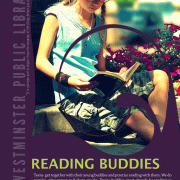French Reading Buddies helps build children's confidence reading in French by pairing them with teen volunteers who read with them and do other activities once per week.
Advanced Planning
Based on our English Reading Buddies program, this program supports the language development of children who are enrolled in one of the city's many early French immersion programs, rather than in the mainstream English program. An additional goal is to provide experience and a volunteering opportunity to local youth, who are required to complete a certain number of service hours in order to graduate.
When the program began, it took approximately three months to plan in advance, and involved both the head of the children's department and the children's librarian. When we began English Reading Buddies a few years earlier, the chief librarian was also involved in determining guidelines for the teen volunteers that we would be using in the program.
The biggest challenge, at first, was low interest, but otherwise there were no unexpected pitfalls. Now that the program has been running successfully for some years, it takes one librarian to plan and run each season of French Reading Buddies. Planning starts in earnest three to four weeks before the first day.
Marketing
We start promoting Reading Buddies around the beginning of the school term: just after Labour Day for the fall session, just after New Years for the winter. This gives us three to four weeks to advertise before the program begins. We typically use the following methods to advertise:
- printed posters and fliers, in-house and around the community
- posts on Facebook, Twitter and our website
- reaching out to district schools that have early French immersion programs and the local Canadian Parents for French chapter
In addition, we send recruitment emails to our teen mailing list and spread the word with the help of French teachers and counselors at the local high school. When the program first began, we had difficulty generating interest from parents. Now we do little advertising; the program is so popular that we regularly have a waitlist. However, we still have some trouble recruiting enough teen volunteers, though direct outreach to French teachers at the school has recently helped.
Budgeting
We provide snacks for the approximately 20 kids and 20 teen volunteers who participate each week. This costs around $10 per week depending on what we buy.
We also give a French book of appropriate reading level to every participant (children and teens) at the end of each term as an incentive. If available, we use donated materials instead of purchasing all of the books, which cuts down on the cost. One could cut costs further by giving something else away as an incentive (a certificate or something similarly easy and cheap to make).
Day-of-event Activity
Each day of the program requires an hour or two to set up chairs and tables in our multipurpose room, photocopy activity and coloring sheets, get everyone's reading logs in order, purchase snacks if needed, and pull a few new books to show the group.
Program Execution
At 3:30 p.m., the pairs meet (under the supervision of the librarian running the program) and select a few books to read. We try to have them read together for at least 15 minutes, whether that is all at once or broken up over the hour. They can then do crosswords, coloring sheets and play word games together.
The program's popularity has been one form of positive feedback, as there is consistently a waitlist for the young buddies, and many families continue to register their children for the program every term. Librarians running the program have also observed children, who are at first reluctant to participate, beginning to read more confidently and developing a great rapport with their teen buddies.
Advice
Leave lots of time to recruit volunteers and sign up children. If you wish to have a training session for the volunteers ahead of time (which is recommended), you'll have even less time to recruit. Essentially, plan ahead as far as you can.
Make sure expectations are clear at the outset for parents and participants. Some parents may expect the teen volunteers to teach their children to read, so we always make sure to emphasize that the program is for practice and fun, not a formal tutoring arrangement. Parents must sign up in person, preferably with the child, so we have an opportunity to chat with them and verify that the children are able to read French at least a little bit.
Supporting Materials
- Feedback (Coming Soon!)
- Programming Librarian Facebook Group




